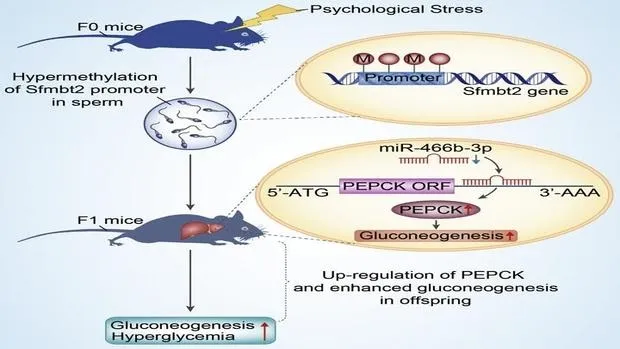The health of the future son is not only influenced by the behaviors, more or less healthy, adopted by his mother during pregnancy.Also for the general state of health of his two parents, mother and father, since before the same conception.
In fact, the appetite of the future child is conditioned by the weight of his father, indicating that parents not only transmit their genes.And the same goes for its blood sugar levels and, in the long run, its risk of diabetes.
And it is that according to a study carried out by researchers at the Jiao Tong University Faculty of Shanghai (China), men with higher levels of psychological stress have children with higher levels of blood sugar.
As Xiaoying Li, director of this research published in the magazine "Cell Metabolism" explains, "Our study is the result of our great interest in analyzing how changes in behavior influence the homeostasis of glucose.Epidemiological studies have demonstrated the existence of an association between psychological stress and the incidence of diabetes, and we were curious to observe how this association could be transmitted through generations ».
mouse stress
In the study, the authors used animal models - oratones - to those who submitted to high levels of stress.And for this, males confined in plastic cubes for two hours a day over a period of two weeks.
Once the ‘confinement phase’ is completed, the mice showed normal blood glucose levels.However, and compared to those males who could run freely through their cages 24 hours a day, they had a lower weight and higher bloodstinal levels of glucocorticoids - hormones that are released in response to stress.
Finally, the authors allowed the males to be related to females who had not suffered confinement, and the offspring of those with greater stress - that is, those who had been held in plastic cubes - showed abnormally high levels of blood glucose.
The psychological stress of the parents can lead to the development of hyperglycemia in their descent
As Xiaoying Li indicates, "Paternal psychological stress can lead to the development of hyperglycemia in the offspring, at least in mice."
sperm alteration
And this greatest risk of hyperglycemia in children, what does it obey?As they show the results, for the effect of stress on the ‘SFMBT2’ gene.Specifically, stress causes an increase in glucocorticoids, hormones that in turn cause an increase in methyl groups in the ‘SFMBT2’ gene of the sperm of mice.And while these methyl groups do not alter the genetic content - this is, the DNA - of ‘SFMBT2’, do influence how it is finally expressed.
More;The most profuse analysis of the results allowed to observe that hyperglycemia in the descendants is a consequence of the changes in the regulation of the Pepck enzyme, responsible for the control of glucose production in the liver.Specifically, and as a consequence of hypermethylation, the 'SFMBT2' gene from the male - that of the female is deactivated by default - loses its ability to control Pepck's production, which results in their descendants to have an abnormallyelevated of the enzyme in the liver and, therefore, produce greater amounts of glucose.
The good news, the authors stand out, is that "once the mechanisms involved, we could block the effect of glucocorticoids on mouse sperm."In fact, the inoculation of the ‘stressed’ males of a molecule that counteracts the effect of glucocorticoids stopped the hypermethylation of the gene‘SFMBT2’ and, therefore, the alteration in the control of the Pepck enzyme.
So it is that, as Xiaoying Li concludes, "it is potentially possible that, although in the future, our results can be extrapolated to the treatment of hyperglycemia in human beings."


